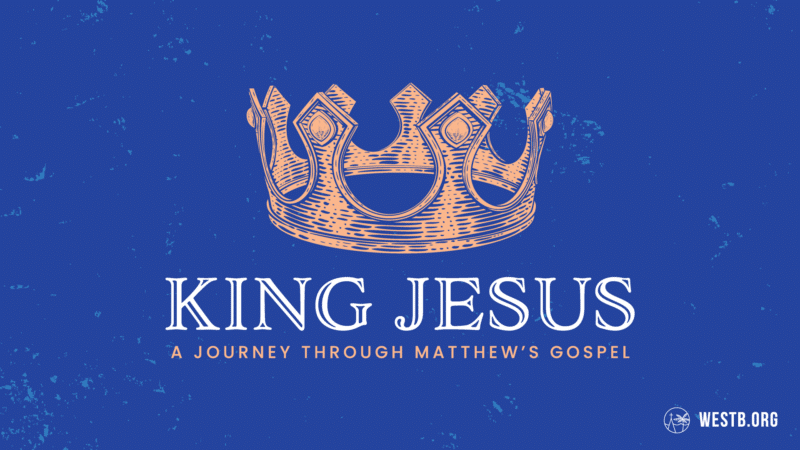How NOT to Enter the Kingdom of God
Series: King Jesus
Sermon Title: When It’s Appropriate to Turn Over Tables
Speaker: Jonathon Jankovich
Date: September 29, 2024
Reflect
- What’s something you’ve changed your mind about recently, and what led you to that change?
- If you had to describe someone who truly lives out their beliefs, what characteristics would stand out to you?
Encounter
- In the parable of the two sons (Matthew 21:28-32), what is the difference between the two sons’ responses, and how does this reflect on obedience versus words?
- How does the concept of repentance as a “change of mind” or “turning around” shape our understanding of following Jesus?
- In the parable of the wicked tenants (Matthew 21:33-46), why do the tenants refuse to give the owner his due, and how does this apply to how people view God’s authority over their lives?
Transform
- In what areas of your life do you feel you need to align your actions with your words when it comes to obeying Christ?
- How can our church, as a community, better reflect the fruit of the kingdom by living in obedience to Christ rather than just knowing the right theology?
Additional Discussion Questions
- Why do you think Jesus often used parables to convey difficult truths about the kingdom of God?
- How does understanding ourselves as tenants rather than owners shape how we view our possessions, time, and resources?
- What does it mean for you personally to “wear the right wedding clothes” in the context of being part of the kingdom of God?
Interesting Facts and Tidbits
- Metanoia: The Greek word for repentance literally means “to change one’s mind,” emphasizing a complete turnaround in behavior and attitude.
- Tenants vs. Owners: In ancient Israel, tenant farming was a common practice, so Jesus’ listeners would have understood the severe implications of tenants refusing to give the owner his share.
- Isaiah and the Vineyard: Jesus’ use of vineyard imagery links directly to Isaiah 5:1-7, where Israel is portrayed as God’s vineyard that has failed to produce fruit.
- Cornerstone Imagery: Jesus quoting Psalm 118:22 about the rejected stone becoming the cornerstone reflects His rejection by the Jewish leaders but exaltation by God.
Related Passages
- Isaiah 5:1-7 – This passage provides a foundation for understanding the imagery of the vineyard, portraying Israel as a vineyard that failed to produce fruit, much like the parable of the wicked tenants.
- Mark 1:4-5 – This highlights the ministry of John the Baptist, who preached repentance (metanoia) for the forgiveness of sins, connecting to Jesus’ message in Matthew 21:32.
- Psalm 118:22 – Jesus quotes this to describe how He, the rejected stone, becomes the cornerstone. This is crucial for understanding how Jesus fulfills Old Testament prophecy and is exalted despite rejection.
- Zechariah 3:4 – The changing of filthy garments for clean ones in this vision parallels the idea of being clothed in righteousness for the kingdom of God.
Key Terms:
- Repentance: A Greek word meaning to “change one’s mind” or “turn around.” It involves a complete change of heart, direction, and behavior, specifically turning from sin toward God. In the sermon, it emphasizes the need for a heart change as the foundation of entering the kingdom of God.
- Obedience: The act of following through on commands or instructions. In this sermon, obedience is contrasted with merely giving the right answer. True faith is shown through actions, not just words.
- Kingdom of God: A central theme in Jesus’ teaching, referring to God’s reign and rule over all creation. Entrance into the kingdom of God is determined by repentance, faith, and obedience to Christ, not just theological correctness.
- Pharisees: A group of Jewish religious leaders known for strict adherence to the law. In this sermon, they are criticized for having correct theology but lacking genuine obedience and repentance.
- The Two Sons: A parable told by Jesus in Matthew 21:28-32, where one son initially refuses to obey his father but later repents and does the work, while the other agrees to obey but fails to follow through. The story emphasizes that true obedience is shown in actions, not just words.
- Wicked Tenants: A parable in Matthew 21:33-46, representing the people of Israel (and particularly their leaders) who refuse to give God the fruits of their labor. The tenants’ rejection of the owner’s son symbolizes the rejection of Jesus as God’s Son.
- Cornerstone: In ancient construction, the cornerstone was the foundational stone that held the structure together. Jesus refers to Himself as the cornerstone that the religious leaders rejected, based on Psalm 118:22. This signifies Jesus’ central role in God’s kingdom despite being rejected by the leaders.
- Vineyard: Used as a metaphor for Israel in both the parable of the wicked tenants and in Old Testament texts like Isaiah 5. The vineyard represents God’s people, and the fruit they are supposed to produce symbolizes righteous living and obedience to God.
- Righteousness: The quality of being morally right or justifiable. In the sermon, Jesus teaches that true righteousness comes from repentance and faith, not from self-made moral achievements or a “resume” of good works.
- The Wedding Garment: In Matthew 22:1-14, the wedding garment represents the righteousness provided by Christ. Being appropriately dressed for the wedding symbolizes being clothed in Christ’s righteousness, rather than relying on one’s own works for entrance into the kingdom of God.

